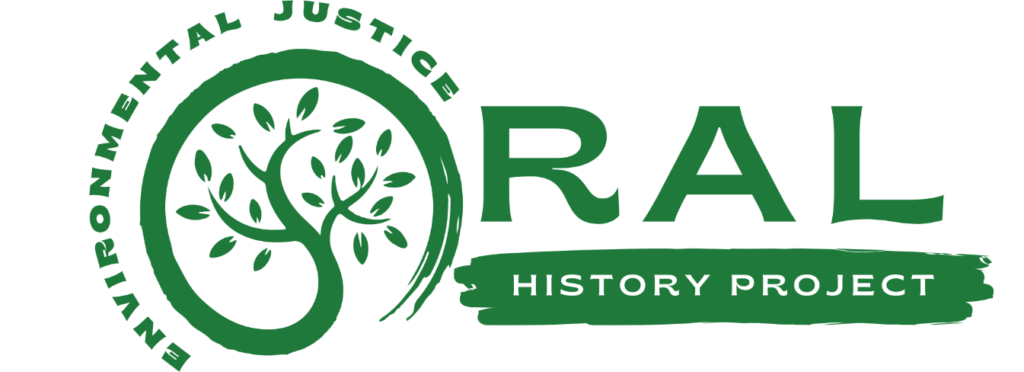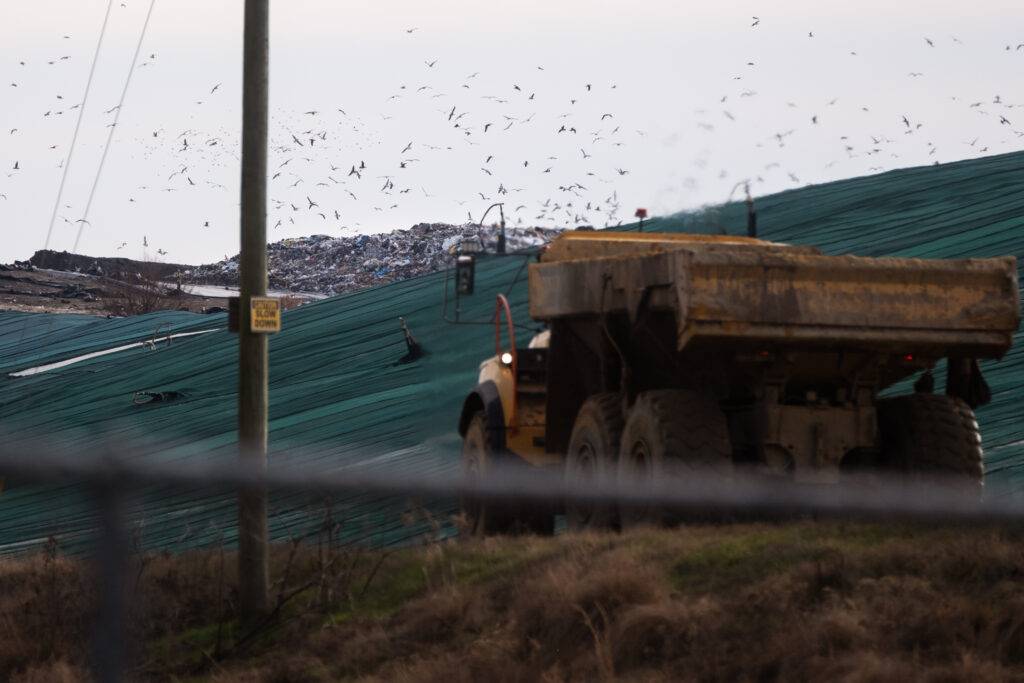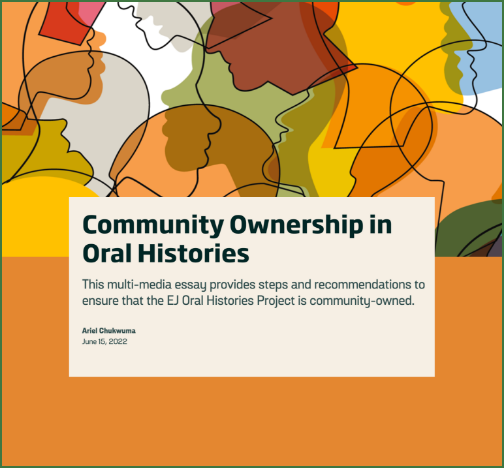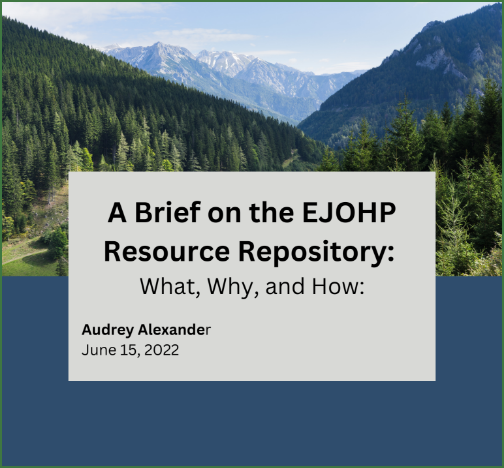Media & Resources
Oral History as an Under-Resourced Data Tool
The emphasis on data in academic, political, and activist spaces – on numbers, emissions factors, and on environmental issues exclusively – can result in a de-centering of the communities and the larger place that are affected by these hazards. When you lose sight of narrative, places become interchangeable; the approach to political or agency interventions don’t consider the critical relationships, the individualized contexts, expert knowledge, and the needs of the communities contending with these issues.
With this in mind, we present oral history collection, archiving, and storytelling as an important, and missing point of reference – point of data– in addressing environmental injustices, using rural communities in Eastern North Carolina as a starting point and case study. We argue that programs like the Environmental Justice Oral History Project – an archive and digital resource that uses a multitude of storytelling methods to educate, empower, and supplement data collection in environmental justice communities in the American South – are an underutilized resource.
In Conversation, In Community Podcast
In Conversation, In Community is a celebration of all that the Environmental Justice Movement is and has been. This EJOHP sub-project, in recognition of the 40th anniversary of the EJ movement, connects with those on the ground working to rectify the systemic impacts of pollution, industry, and climate change on historically disinvested and underresourced communities. We’re sitting in conversation with youth climate justice advocates, government workers, and those organizers who helped found the movement 40 years ago.
The purpose is not to tell people why they should care about EJ but to ask those ingrained in the movement why they care, and to reflect on the common experiences, ancestral connections, and modern injustices that pushed these amazing advocates into action. We look forward to sharing with you!
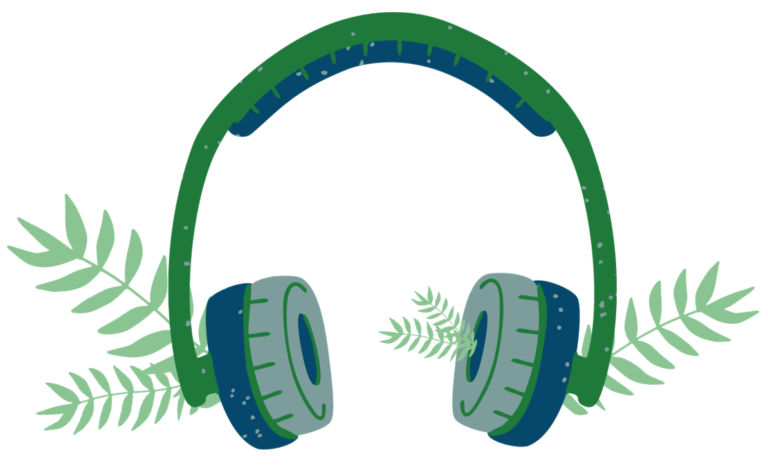

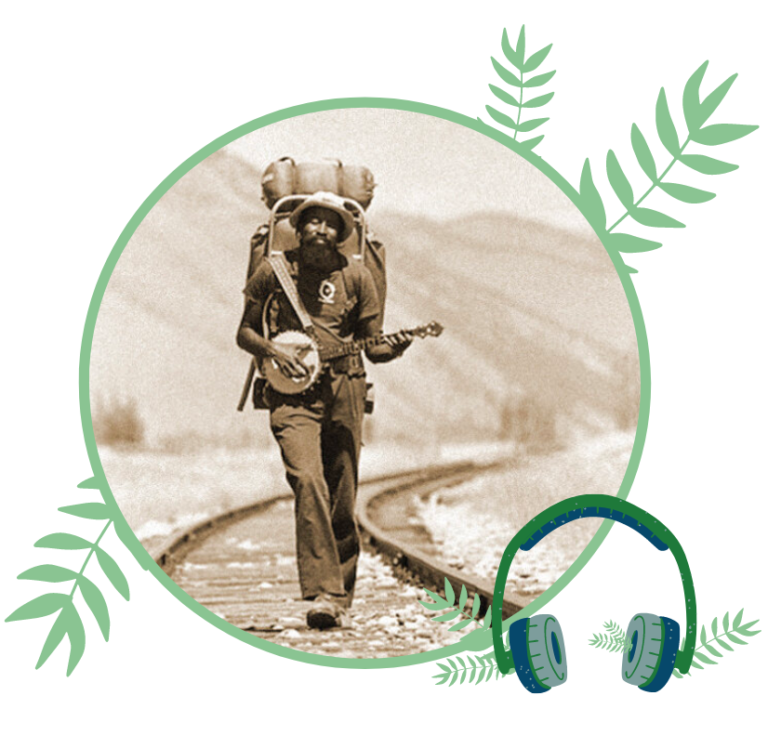
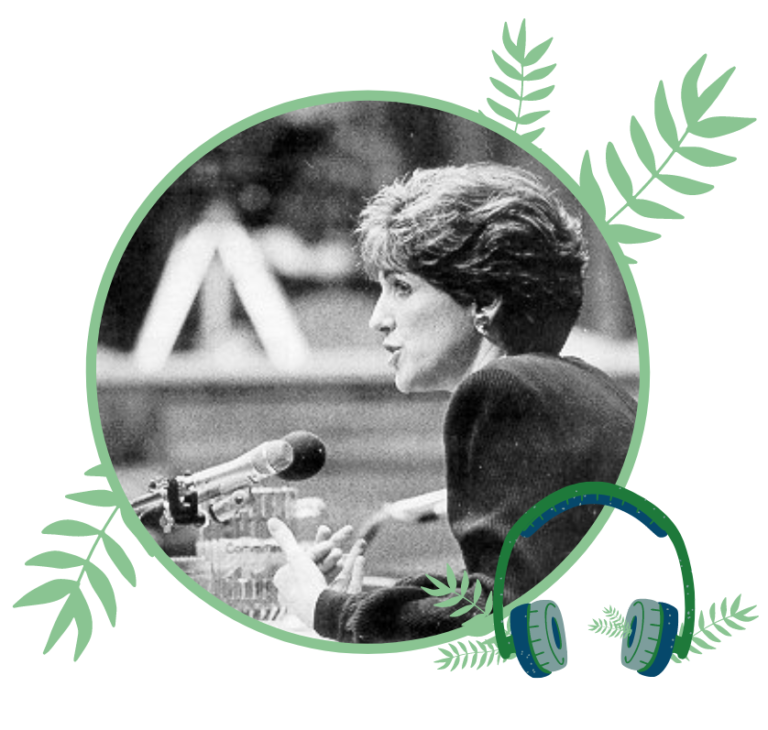
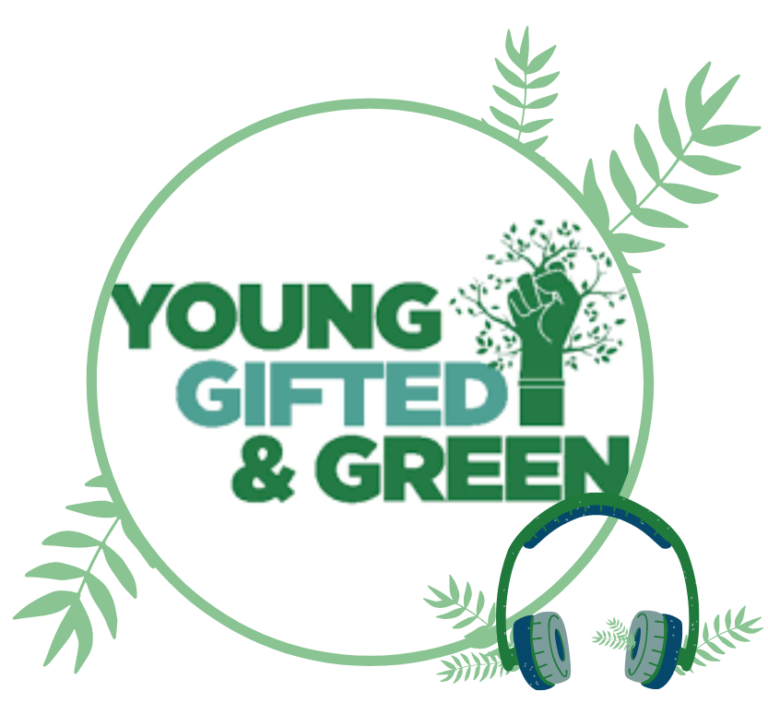
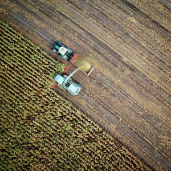





PROJECT JOURNALISM
Advocacy journalism, community journalism, and solutions journalism are forms of professional writing that ensure on-the-ground organizers, elders, and environmental justice communities are centered in mainstream coverage. In an attempt at further centering and cementing community narrative in modern media, we worked with our community partners to develop specialized articles. From Alabama to Louisiana and back to our partners in Warren County and Piney Woods Free Union, North Carolina, the goal of these articles is to contribute to a journalistic paradigm shift.
A big thank you to environmental journalist Amal Ahmed for her wisdom and insights in the early stages of this process. You can view her workshops in the “Research” section below.
Nourishing Roots in the Birthplace of Environmental Justice
Ancestral wisdom is guiding communities in eastern North Carolina as they eye new funding from President Biden’s Justice40 Initiative.
By Cameron Oglesby
Supported by Grist and the Center for Rural Strategies.
Published in Atmos Magazine.
Waste, Race, and Place
In Snow Hill, North Carolina, a community has waged a 50-year fight against the state’s largest landfill.
By Cameron Oglesby
Supported by the Uproot Project Environmental Justice Fellowship.
Published in The Assembly NC, Grist, and Spotlight on Poverty and Opportunity.
In January 2024, in collaboration with Concerned Citizens of Sampson County and Snow Hill residents, we developed and printed a supplemental brochure that can be distributed to community members and elders with limited access to the article.

[1 of 3]
Disaster Gentrification: How Communities Are Forever Remade By Major Storms
The Climate Change Trials: Louisiana’s River Parishes
By Amanda Ostuni
To be published by Scalawag Magazine.
Coming Soon

[2 of 3]
Why They Stay
The Climate Change Trials: Louisiana’s River Parishes
By Amanda Ostuni
To be published by Scalawag Magazine.
Coming Soon

[3 of 3]
Working Through the Red Tape
The Climate Change Trials: Louisiana’s River Parishes
By Amanda Ostuni
To be published by Scalawag Magazine.
Coming Soon
Celebrating 40 Years of Environmental Justice
Environmental Justice was a concept and movement created to counter blatant racism and discrimination taking place within the environmental movement. It is founded in principles of equity, place-based and cultural connections to nature, and the understanding that humanity and human health is inextricably linked to the Earth.
In September 2022, in celebration of the 40th anniversary of the Environmental Justice Movement in North Carolina, we developed a series of large-scale events that attempted to spotlight the history, modern circumstances, and continued outlook of the EJ movement in the U.S. In April 2023 for Earth Month, we expanded on these programs centering on Action for Environmental Justice – how can we as students and young organizers go about affecting change in our communities?
Casting Your Ballot for Environmental Justice
September 8, 2022
Recalling Warren County Discussing the Birth of a Movement
September 14, 2022
Environmental Justice: Past, Present, and Future
September 15, 2022
Environmental Justice in the Latinx Community
September 29, 2022
“We Birthed the Movement” Commemorative March and Torch Passing
Coley Springs Baptist Church | September 17, 2022
Captured by the Southern Documentary Project
The Roots, Experiences, and Future of Climate Justice
September 30, 2022
Environmental Justice Storytelling for Impact Summit: Keynote
Eileen Trần with Intersectional Environmentalist
April 4, 2023
Environmental Justice Storytelling for Impact Summit: Panel
Journalism with The Uproot Project
April 4, 2023
Environmental Justice Storytelling for Impact Summit: Workshop
Radiah Shabazz with the People’s Climate Innovation Center
April 4, 2023
Student Videos
As a part of the “We Birthed the Movement” programming in Fall 2022, students developed short videos commemorating the 40th anniversary of the Environmental Justice Movement in Warren County. Thank you so much to the Warren County Environmental Action Team for allowing our students to participate and film their programming.
The Birth of a Movement
Kaylee Rodriguez
40 Years Later
Jasmine Clairsaint
Research Projects & Resources
Given the historically extractive nature of both academic and journalistic institutions, a research team was tasked with developing a methodology for intentional, equitable, and meaningful interaction with community partners for both the oral history and journalistic components of the EJ Oral History Project.
We hope that these materials serve as a starting point for future bodies of research and case studies of intentional community engagement practice and environmental justice storytelling work.
Story+ 2022 | Environmental Justice and Oral Histories
Our team, “Collecting Oral Histories of Environmental Racism and Injustice in the American South,” set out in Summer 2022 to tackle a methodological quandary: how can we prepare future students to conduct ethical environmental justice oral histories? To answer this deceptively simple inquiry, the project’s undergraduate researchers addressed three related questions, which they took apart, expanded, simplified, and made their own over the course of the six weeks of the program.
Their final deliverables are available below.
Project Documents
Below are a few templates and materials that were used as a part of our research and oral history processes. These include our course syllabus, transcript protocols, interview guide drafts, and guidelines/guidance that was critical to our student’s work. We encourage you to review these materials and draw from them as you develop your own protocols.
Class Session Recordings
Over the course of 2022 and 2023, our team developed a class through Duke’s Bass Connections program which provided opportunities for students to learn about environmental justice and develop the mindsets and skills necessary for community oral history and journalism work.
Below are a few guest lectures and class recordings held as a part of this class – on the history of environmental and climate justice, on intentional storytelling and recording trauma, and on effective oral history and journalism work.
Students also participated in an oral history interviewing workshop facilitated by the Southern Oral History Project at the University of North Carolina @ Chapel Hill as well as a racial bias and justice workshop hosted by the Equity Paradigm. Learn more about their work below.
Mini-Doc: As Told By the Black Farmers of Nacogdoches, Texas
Black land loss is a U.S. phenomenon that has served as an environmental justice focal point in this project. The following is a documentary produced and very graciously shared by one of our oral history narrators, Igalious Mills, on this very topic.
Centered on the testimony of third generation farmer, Adell Mills, this mini-documentary is a tribute to the Black farmers that lost land and continue to lose land, wealthy, and place as a result of the 1933 Agricultural Adjustment Act, which outlined programs like the Cotton Allotment Policy, perpetuating the systems of share-cropping that contributed to cycles of Black poverty and land theft in the U.S.
Reflections
Over the course of the 2022-2023 school year, we’ve worked with our students to develop a basic understanding of environmental justice, ethical storytelling, and oral history. We asked that our students develop comprehensive reflections about their experience in the program – what worked and what didn’t – to be used as a case study for future student oral history programs. With permission, here is a small collection of student reflections; we encourage you to use their experience as points of reference in your engagement work.
Learn More
Reflection: Ameena Hester
Ameena is the assistant project coordinator for the project and the project's primary liaison to the University of North Carolina at Chapel Hill. She joined us in January 2022 as a member of our Bass Connection course, a contributor to the journalism and podcast work, and has generally served as a critical collaborator and sounding board for project direction and longevity.
Learn More
Reflection: Nhu Bui
Nhu was one of the original student volunteers when the project was conceived of in September 2021. She has been a significant support in the development of the journalism component and the oral history resources.
As one of our longest standing volunteers, Nhu also presented our project outcomes at the Bass Connections Fortin Foundation Showcase in April 2023.
Learn More
Reflection: Amanda Ostuni
Amanda was one of our few graduate student Bass Connections volunteers and a central collaborator on the journalism component and the Gulf South oral history collection – specifically the conversations centering Louisiana communities.
Learn More
Reflection: Meghna Parameswaran
Meghna was one of our undergraduate Bass Connections volunteers and contributed to the podcast component as well as the Southern Advocate and Piney Woods Free Union oral history collections. Meghna also helped with outreach and planning for the EJOHP Spring 2023 set of Earth Month events.
As one of our students with the least oral history or environmental justice experience leading up to the project, Meghna also presented our project outcomes at the Bass Connections Fortin Foundation Showcase in April 2023.
Learn More
Reflection: Ryan Parks
Ryan Parks was one of our few graduate student Bass Connections volunteers. His work consisted of collecting oral histories in a few of the historically Black neighborhoods of Durham, NC as well as producing most of our documentary content.
Learn More
Reflection: Rachel Kamis
Rachel Kamis was one of our undergraduate Bass Connection volunteers, joining us in Spring 2023 for our final semester. She contributed to the podcast component as well as the Southern Advocates and Piney Woods Free Union collections.
Learn More
Reflection: Megan Corey
Megan was one of our undergraduate Bass Connections volunteers contributing to the Southern Advocate and Piney Woods Free Union oral history collections.
Learn More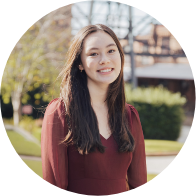
Reflection: Tashia Ethridge
Tashia was one of our undergraduate Bass Connections volunteers contributing to the Southern Advocate and Piney Woods Free Union oral history collections.
Learn More
Reflection: Madeline Waterfield
Madeline was one of our undergraduate Bass Connections volunteers contributing to the Southern Advocate oral history collection.
Learn More
Reflection: Hattie Halloway
Hattie was one of our undergraduate Bass Connections volunteers helping us transcribe many of our oral histories from the Piney Woods Free Union and Union Hill collections.
Learn More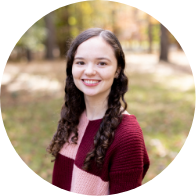
Reflection: Sophia Chimbanda
Sophia was one of our undergraduate Bass Connections volunteers contributing to the Southern Advocate oral history collection.
Learn More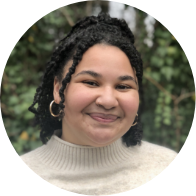
Reflection: Christina Boxberger
Christina was one of the original student volunteers when the project was conceived of in September 2021. She participated in the journalism component of the project and contributed to the Piney Woods Free Union oral history collection.
Learn More
Reflection: Victoria Ely
Victoria was one of our undergraduate Bass Connections volunteers contributing to the Southern Advocate oral history collection.
As one of our few students with previous oral history collection experience, her procedural insights were a great help to the project.
Victoria also presented our project outcomes at the Bass Connections Fortin Foundation Showcase in April 2023.
Learn More
Reflection: Dani Sullivan
Dani was one of our few graduate student Bass Connections volunteers. They worked exclusively on the Gulf South oral history collection – specifically the conversations centering Houston, TX advocates.
Learn More
